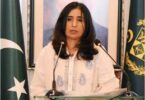F.P. Report
ISLAMABAD: The National Economic Council (NEC) on Tuesday proposed the Annual Development Plan (ADP) for the upcoming fiscal year (2023-24) with a total outlay of Rs2.709 trillion.
“The total national outlay [Rs2,709 billion] contains the development budget of Punjab and Khyber Pakhtunkhwa for only four months [due to caretaker set up in the province), but if their full budget is included in the ADP, it will exceed the figure of Rs 3 trillion,” Minister for Planning, Development and Special Initiatives Professor Ahsan Iqbal said in the post-NEC meeting media talk. The NEC meeting was chaired by Prime Minister Shehbaz Sharif.
Under the ADP, the minister said the federal government would spend Rs1,150 billion under the Public Sector Development Programme (PSDP 2023-24) and the provinces would allocate Rs1,559 billion to execute different development projects. He said Rs1,150 billion under the PSDP were the highest-ever allocation made in the history of the country, terming it a ‘milestone achievement’ of the incumbent government despite severe financial challenges.
Ahsan Iqbal said the highest-ever development budget was allocated for the Higher Education Commission (HEC) as around Rs60 billion had been proposed in the next fiscal plan in the NEC meeting, which was also attended among others by chief ministers of Punjab, Sindh and Khyber Pakhtunkhwa besides Balcochistan’s Planning Minister .
He said it would help expand academic facilities, modernize laboratories for research, adding Pakistan needed to double the number of its universities and classrooms at par with regional countries. He said the water sector was also prioritized and its allocation had been increased from Rs 97 billion to Rs110 billion. The minister said development fund for merged areas of Khyber Pakhtunkhwa had been increased from Rs 53 billion to Rs 57 billion whereas the allocation for Azad Jammu and Kahsmir and Gilgit-Baltistan had been enhanced from Rs 55 billion to Rs 61 billion.
Initiatives for elimination of hepatitis and fighting diabetes had also been planned for the year 2023-24. For development of the communication network, he said the allocation of National Highways Authority had been enhanced from Rs101 billion to Rs161 billion with special focus on completing the ongoing projects that were stopped because of lack of funds.
Ahsan Iqbal said the incumbent government had prepared a comprehensive 5-E framework, that would not only resolve the immediate economic issues but would also lay foundation for the long-term growth. The 5-Es include Exports, E-Pakistan, Environment, Energy & Infrastructure and Equity & Empowerment.
Exports: The minister said strategy had been evolved to channelize exports through the PSDP and policy initiatives and getting access for industry, agriculture, information technology, mining and manpower in the global market.
This could help earn huge foreign exchange, he said, adding under the annual plan for upcoming fiscal year, all five sources would be developed and promoted to increase the export potential manifold.
E-Pakistan: The minister said E-Pakistan or digital Pakistan was one of our main preferences of the government at a time when the world had been witnessing digital revolution. He said the government would try to set new foundation for productivity as no economy could succeed unless it was established on sound digital base.
He said the government would promote a project titled ‘Internet-for-All’ and launch Digital Literacy for Youth besides promoting digitization in the education sectors. He said the government also aimed to establish national centres for technology, automation centres, National Center for Quantum Computing while National Centre for Nano-technology would be reviewed and National Center for Manufacturing would be set up to make industry competitive.
Environment: The minister said Pakistan was one of the countries that were most affected by the climate change in the world, hence the government was focusing on water and food security. He said the national flood protection programme would be revived this year, initially in Sindh and Balochistan where floods played havoc, with an aim to improve water channels and infrastructure and reduce the flood losses.
On food security, he said, new initiatives would be launched in addition to PM’s special initiatives of solar tube-wells, and Green Revolution 2.0 to ensure food security by switching over the modern techniques and technology. He said initiatives had also been planned to link agriculture with technology, adding there was need of ‘fresh green revolution’ through bio-technology, digital technology and drone technology.
Under ‘Green revolution 2.0’, new interventions would be made and cooperative farming would be introduced on new lines. He said the federal government was initiating a new project regarding climate change for which Rs 400 million for Balochistan flood rehabilitation and reconstruction has been proposed. The total cost of the project would be Rs1 billion for rehabilitation of the flood-affected homes, infrastructure and fields.
Energy and Infrastructure: Ahsan Iqbal said energy had become a big challenge for Pakistan and the government would reduce dependence on fossil fuels and imported oil, and give due focus on energy conservation. He said it had been proposed that commercial areas and shops would be closed at 8 pm and replace old bulbs with LED lights. This initiative could save around $1 billion annually, he added.
He said representatives of provincial governments were present in the NEC meeting and they had been advised to get it implemented to save precious resources. Likewise, the government would promote green energy. solar, hydel and wind energy and no new imported fuel-based project would be introduced.
Equity and Empowerment: The minister said the government was aimed at eliminating inequality by especially focusing on uplifting of youth and women by providing them opportunities to prosper and progress. “No One Left Behind” would be the tag-line to promote equality. He said, in addition, 20 poorest districts would be selected wherein investments for accelerated development would be made to bring them at par with national average.
The minister said over Rs100 billion schemes would be initiated for youth including technical training, education, IT skills, laptops, sports facilities, start-ups, women entrepreneurs and other projects. He said youth would be given positive incentives to make them members of economy instead of polarizing them to burn the Jinnah House, a tragic incident that took place on May 9 following the arrest of PTI chairman. “We will make them digital workers and create future Bill Gates,” he said adding a programme of awarding around 60,000 internships had already been launched.







